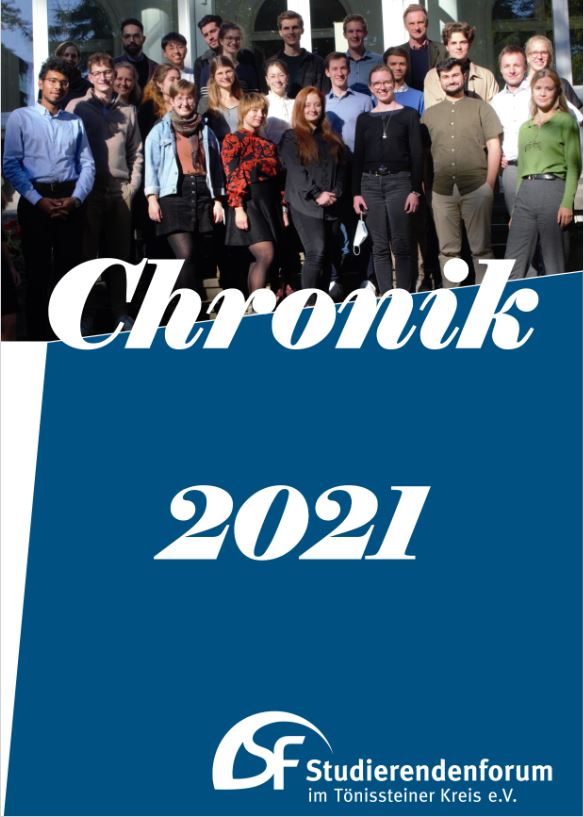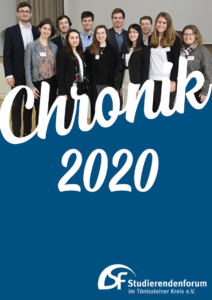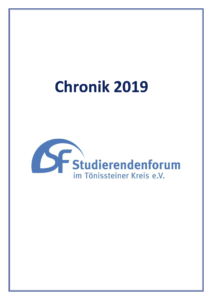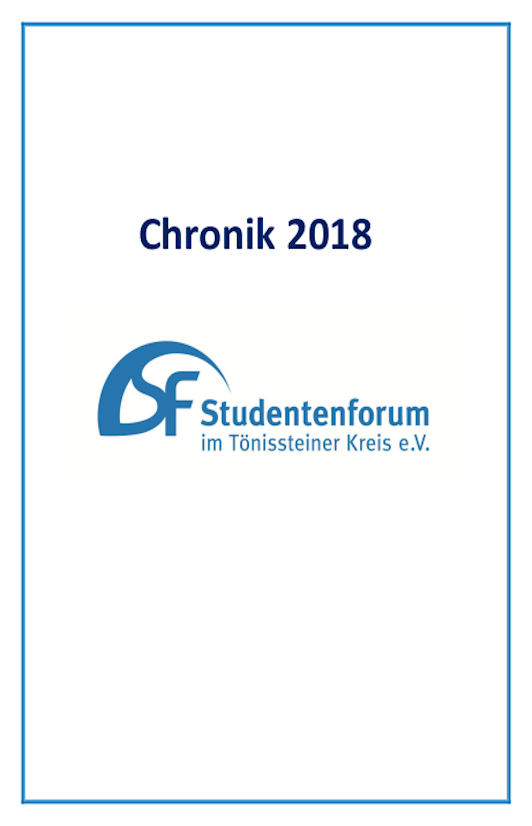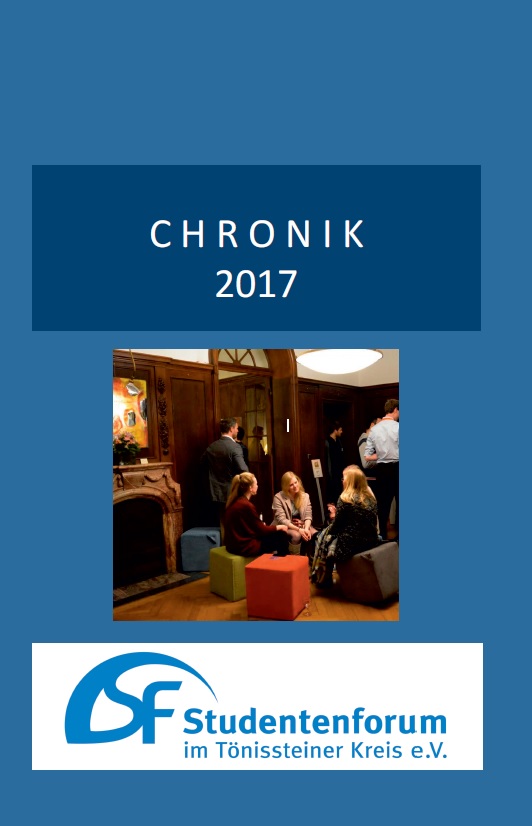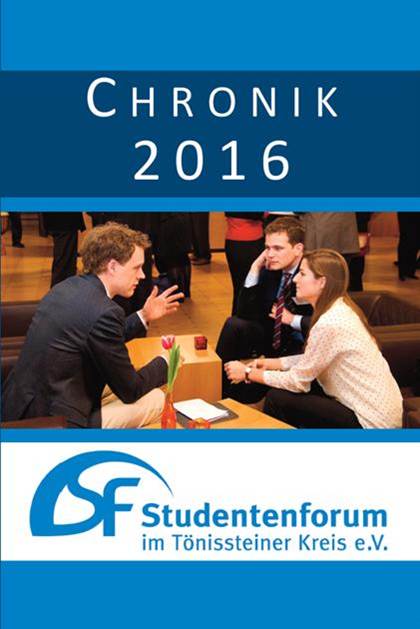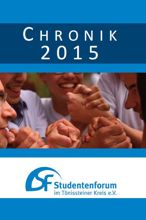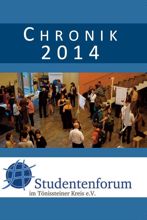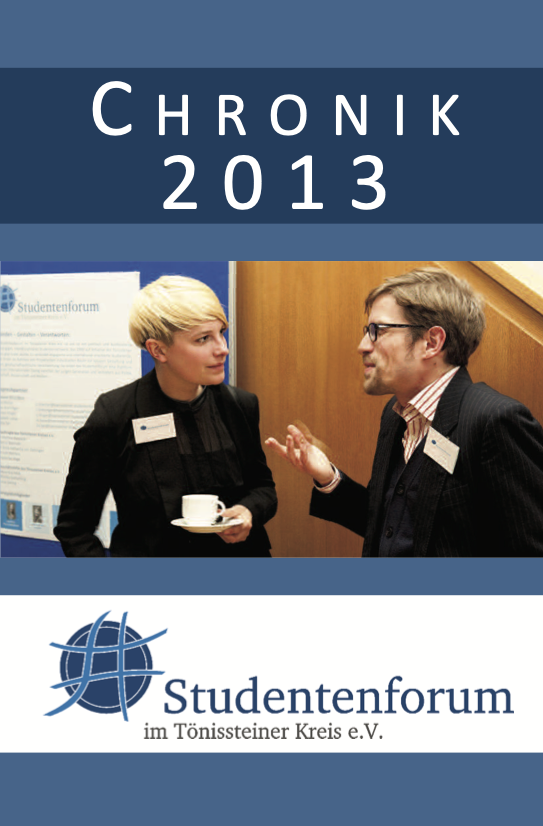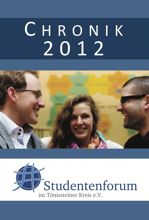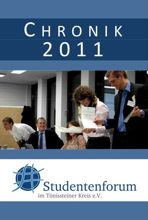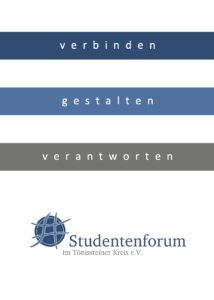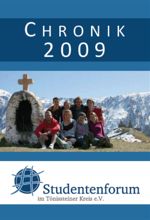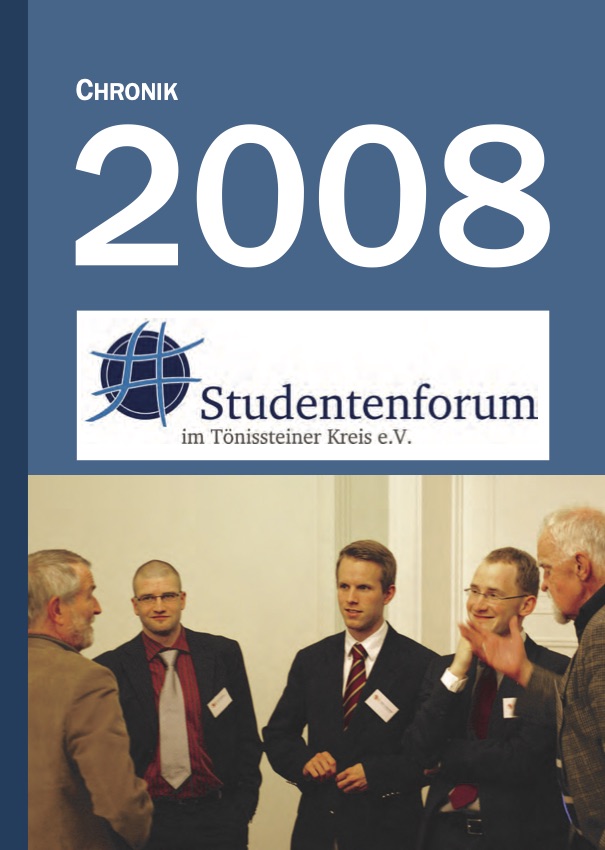A Year in Review – the Chronicle
The chronicle provides an overview of the most important projects and highlights of the association’s year. Every year, thanks to the commitment of the approximately 230 members, numerous projects can be successfully completed, new projects initiated and the cooperation on a national and international level expanded to partners such as the members of the Politeia Network.
The 2022 Annual Chronicle, the 2019 Anniversary Issue, and the other thirteen issues illustrate the multi-faceted nature of the Student Forum, the diversity of its projects, and their flourishing development over more than ten years.
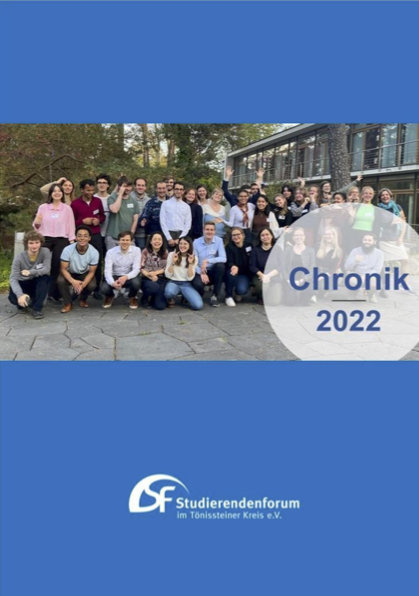
The Student Forum in the media
Berlin Foreign Policy Forum 2020
December 2020
“Turning Crisis into Opportunity? Europe in a (Post-) Pandemic World Order”. This was the main theme of this year’s “Berlin Forum on Foreign Policy”, which was hosted for the tenth time by the Körber Foundation in cooperation with the German Federal Foreign Office on November 24, 2020. Every year, the event brings together around 250 high-ranking national and international figures from politics, think tanks and journalism to discuss foreign policy challenges for Germany and Europe. 20 members of the Student Forum also had the opportunity to attend the completely hybrid conference from their desks at home – with live and on-site guests.
Full article (German) – Karim Saleh
Student Forum in the LEAD blog of the Mercator Foundation
7 March 2017
“What I decide today, I must be able to tell my mother tomorrow”
A guest article by Maike Sieben and Pepe Strathoff (Translated from German to English)
The “value compass” belongs in every well-sorted guide toolbox. But where do you get one—do you build it yourself or do you give it off the shelf—and how do you use it? We present five theses.
Since the economic and financial crisis, the supposed loss of values of entrepreneurs and managers has been publicly discussed worldwide. In both Europe and the USA, populist movements are profiting from the loss of confidence in economic and political elites. The VW exhaust scandal, the exposure of systematic tax evasion by the Panama Papers, the nepotism of top earners in the American election campaign—all this seems to prove that the pursuit of profit and ethical principles of action are incompatible.
But where do business leaders acquire the values they follow in their professional activities? And how can prospective leaders be supported in developing an individual professional ethos? These were the questions posed by a project group of the Student Forum in the Tönissteiner Kreis. As a dialogue and project forum, this association connects committed and internationally oriented students and young professionals of all disciplines. Its members initiate projects and create dialogues between the young generation and representatives from business, science, politics and the media – such as the series of interviews on the topic of “Business and Values” described in this article. In doing so, we have deliberately sought out discussion partners from industries that are subject to criticism in the debate on ethical leadership behavior: IT, defense, pharmaceuticals, logistics, chemicals, and mining. In their diversity, the discussions provide an insight into the ethical thinking and actions of German managers.
Their results can be condensed into five theses:
You can find the article (in German) here.
Student Forum on Friday
The borders wind
A blog post by Friday community member Klaas Hendrik Eller (Translated from German to English)
Project Fortress Europe?
The motto of this year’s unified celebrations will demand a rhetorical egg dance from many a keynote speaker. “Overcoming Borders” is currently not suitable as a headline for comfortably remembering the dazzling moments of the peaceful revolution. The contradictions to the images of renewed border controls and physical border security in Europe are too obvious. The much conjured up “capacity limits” seem too irritating in the face of this slogan. Moreover, the slogan evokes painful memories to the day. In Italy, the “tre ottobre” has become the cipher for the devastating shipping accident two years ago, in which more than 350 people seeking protection died a few meters off the coast of Lampedusa. What was a wake-up call for Italy affected Europe at its core. Lampedusa has acquired tragic significance not as an Italian island but as an outpost of Europe. It is the central lesson of recent years that supposedly local events reflect the guidelines of European refugee policy.
You can find the article (in German) here.
Student Forum in the Oxford Monitor of Forced Migration
1 May 2013
“Fortress Europe?” has a worldwide audience
Oxford Monitor of Forced Migration Vol. 3, No. 1
Project Fortress Europe?
“Trapped in Greece: A Report about Experiences of Migrants, Asylum Seekers, and Border Policemen during the Early Weeks of the Operation Xenios Zeus” is the title of the article and was written by members Nele and Janna Weßels. They led the project “Migration at Europe’s External Border – Fortress Europe?” of the Student Forum and could now present their observations from the project work in OxMo. This kind of publication is part of the strategy of the project, which already received the Tönissteiner Prize 2012.
You can find the article here (pages 7-9).
Local media had already reported on Project Phase II.
DAAD Newsletter 03/12
March 2012
Student Forum in the Tönissteiner Kreis: Cross-border Dialogue
Zsófia Tari and Kay Neumann are fit for global challenges. The DAAD scholarship holders are involved in the Student Forum of the Tönissteiner Kreis e.V., where they design their own projects and are also active in the executive board of the SF. “We only select students for the forum who already have experience abroad, foreign language skills and social commitment,” says Alexandra Heldt, Managing Director of the Tönissteiner Kreis. “The promotion of international junior executives and cross-border dialogue is the main focus of our organization.” Since 1999, students have been given the opportunity to prepare for management tasks in companies or international organizations with the help of the DAAD-funded Student Forum. The forum now has 150 members. “We support the young academics with a network of older mentors in an advisory capacity,” says Alexandra Heldt.
Despite the support, one thing is required above all: independent thinking. After a creative colloquium – in which students exchange ideas for a weekend – it is important to develop independent projects. Current debates, but also fundamental questions of politics, culture, economy, and science are realized in the form of think tanks, international conferences or sur-place dialogues. “My first project was the ‘Weimar Youth Forum 2010’. Since the conference was organized in cooperation with the French and Polish partner organizations of the Tönissteiner Kreis Student Forum, this was an excellent opportunity to get to know the international network of the Student Forum, the Politeïa Community,” says Zsófia Tari. “One of the aims of our team was to raise awareness of the socio-political implications of demographic change and to bring them into the public debate. Kay Neumann, who has already been working for the Ernst Abbe University of Applied Sciences Jena in the International Office for two years, also focuses on transnational exchange in his projects: “Trips to Morocco and Georgia have enabled me to discuss highly topical issues on-site with top-class discussion partners. Like Zsófia Tari, who is responsible for the coordination of the institutional and project-related fundraising of the Student Forum, Kay Neumann has taken on responsibility for her own departments as a member of the board: “We support and advise the various project groups in fundraising, in addressing speakers and project partners. — Christina Pfänder (Translated from German to English)
Published in the DAAD Newsletter, issue No. 03/12
Weimar Youth Forum 2010: Lost in demographics?
FEST für die Praxis, Vol. 7, “In the spirit of understanding. 20 years of lived cooperation”
info@fest-heidelberg.de
Project Weimar Youth Forum
by Constanze Blum (Translated from German to English)
Title
Weimar Youth Forum 2010: „Lost in demographics? A young perspective on the challenges of demographic change“
What is it about?
A trilateral seminar with participants from Poland, Germany and France to support intercultural dialogue and exchange on the transnational issue of demographic change, seen from the perspective of young adults.
Implementing institution
Student Forum in the Tönissteiner Kreis e.V.
www.toenissteiner-studierendenforum.de
Partners
Center of Young Diplomats – Association of Students and Graduates of the Faculty of International Relations at Warsaw University
Conférence Olivaint, Paris
Goal of the project
To strengthen the cooperation between the three partner organizations and to create an intercultural platform for interested and committed young adults to exchange views on transnational and Europe-wide topics, such as this year’s demographic change
Experiences and effects
The project, which took place in Weimar from 5 to 7 November 2010, combined academic work with intercultural dialogue. The conference program consisted of keynote speeches by invited experts on topics related to demographic change, especially family policy, generational justice, and migration. Following on from the discussions and questions that followed the presentations, individual aspects were exchanged in small groups and ideas were jointly developed on how to deal with the consequences of demographic change in the three countries. The workshops were all the more enriching because they were attended by a very balanced number of representatives from each of the three countries. The comparison of the different country perspectives led to interesting and lively discussions. During the conference and workshops as well as during the evening and cultural program, a stimulating exchange developed between the students from the different countries.
The common experience of a successful conference and the personal contacts have strengthened the cohesion between the students of the three countries as well as between the three partner organizations. Following the seminar, a position paper was compiled which summarizes the joint reflections during the various workshops and thus records the results of the seminar.
We hope to continue the project format together and to organize the “Weimar Youth Forum 2011” in France in 2011, the 20th anniversary of the “Weimar Triangle,” which is the ideal basis for the Weimar Youth Forum.
Demographic Change as a Challenge
Project Weimar Youth Forum
A conference of the “Weimar Youth Forum 2010,” the Student Forum in the Tönissteiner Kreis, the Conférence Olivaint Paris and the Centrum Mlodych Dyplomatów Warsaw in Weimar, from 5 – 7 November 2010.
by Zsófia Tari, Brüssel (Translated from German to English)
With a view to the established political discussion rounds between France, Germany, and Poland within the “Weimar Triangle”, students of the Tönissteiner Student Forum developed the idea of an internal platform for regular exchange between young people of the three countries. The initiative of the cross-border dialogue was organised in the framework of the “Weimar Youth Forum” already in a third meeting in Weimar, a highly symbolic place for German-Polish-French relations. 30 members discussed the demographic change “across borders” for three days. The aim of the meeting was to jointly examine the phenomenon of demography within the framework of intercultural exchange on the respective national experiences and to formulate ideas for political measures to deal with demographic change from a young, multinational perspective. The debates took place in three thematic blocks: intergenerational justice, family policy, and migration.
The conference was introduced by Eva Kibele from the Max Planck Institute for Demographic Research. It became clear that all three countries are affected by demographic change and that dealing with this phenomenon plays an important role in the respective national policies. Nevertheless, Germany, France, and Poland are experiencing the effects in very different ways and with different intensities. France as a “country with a high birth rate”, Germany as the “oldest” country in Europe and Poland, mainly affected by strong emigration of the working population: The catchword “demographic change” does not have the same meaning for the three countries. The tension between similar experiences and specific national events turned out to be very appealing and served as a common thread for the discussions during the whole weekend.
Jörg Tremmel, junior professor for generational justice policy at the University of Tübingen, introduced the thematic block “generational justice” in a lecture. Often polemicized in the media (keyword “pensioners’ dictatorship”), Tremmel’s problem was presented on an abstract and social-philosophical level and paved the way for discussions on the importance of intergenerational justice and on the possibilities of avoiding or keeping in balance the domination of older over younger generations. The possible implementation of “fair” political representation, better integration in political decision-making processes of younger or not yet born generations, as well as economic intergenerational justice (the currently envisaged increase of the retirement age in France provided plenty of topics for discussion), were in the focus of attention.
The thematic block “Family Policy” was introduced by Mrs. Sotwiska-Rosanowska, Warsaw School of Economics. The changes in the traditional family image in recent decades in the wake of changing values, but also practical issues, e.g. how to combine family and career, were addressed in her lecture. The participants agreed that political and structural changes are necessary to create better framework conditions for young and unmarried couples (keyword: spouse splitting) and to improve their social acceptance. In France, for example, childcare for small children is very well developed and is used intensively, while in Germany and Poland the image of the “unnatural mother” is still used when a child is placed in care relatively early. It was also noted that in all countries financial incentives alone, such as child benefit, are not sufficient. Instead, a broader approach was favored. The equality of women in working life plays an important role in this context. A more flexible working environment, in which young highly qualified mothers are quickly reintegrated after giving birth, as well as a broader acceptance of the “two-breadwinner” model were considered sensible approaches.
The possibility of alleviating the consequences of demographic change through increased immigration and the resulting social and economic consequences were controversially discussed in the third thematic block. Hans Dietrich von Loeffelholz from the Federal Office for Migration and Refugees spoke on this topic. Migration and demography in the EU member states, the possibility of migration management at the EU level and the challenges of integration were aspects of his lecture. The students discussed current political developments, such as the Blue Card Initiative of the European Union. The question of the integration of immigrants in France against the background of the national identity debate initiated by President Sarkozy, the Polish phenomenon of returning labor migrants or the “death of multiculturalism” that has just been proclaimed and hotly debated in Germany were elements that well expressed the different views of migration and integration in the three European countries. The three days in Weimar offered not only a platform for academic discourse, but also for intercultural exchange between the students of the three countries. What is special about the project is that it focuses on the perspectives of the younger generations, who are most affected by the consequences and challenges of demographic change, and that this is discussed in a “Weimar Perspective,” which stands for an intensive dialogue between France, Poland, and Germany.




